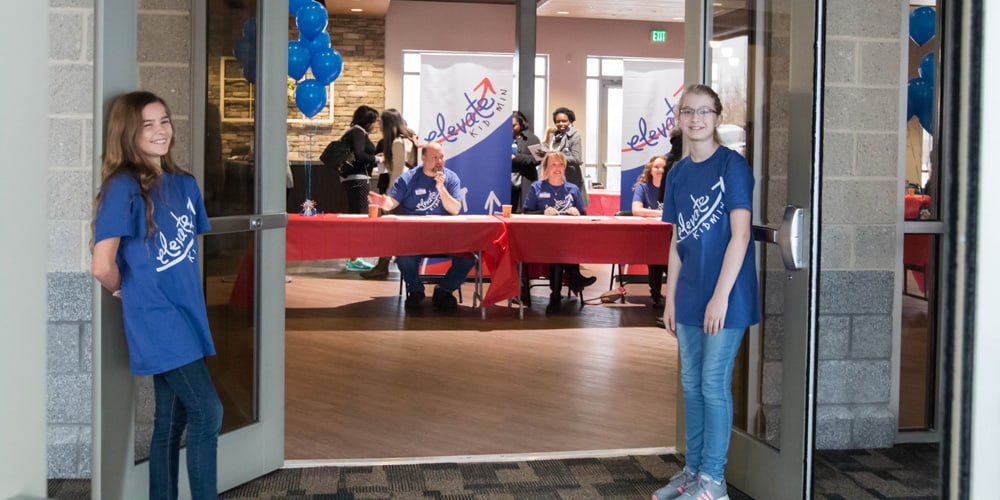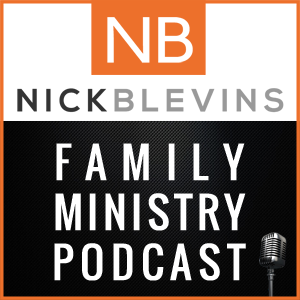One of the biggest challenges we face as ministry leaders is in training and equipping volunteers on our teams. I recently had a great conversation with another family ministry leader who was looking to improve his strategy for training church leaders and volunteers. In that conversation, we got to share ideas and learn from one another. In this post, I'll share 7 key elements that I think should be included as part of a strategy for church volunteer training.
7-Part Strategy for Training Church Leaders and Volunteers
In many cases, training and coaching are not core strengths or skills for us as the leader. In all of our cases, Sunday is always coming and the pressure of being ready for the weekend, along with everything else (meetings, events, care, etc.), pushes out time for investing in volunteers. One benefit of having a strategy for training volunteers is that we already have the plan, we just have to execute it.
#1 – A Strong Onboarding Process
We often tell parents and preschool volunteers how kids learn more in the first 5 years of their life than they do in the rest of their life combined. They can do that because of how their brain works, but God also wired us that way because we need to learn so much early on to function well.
In the same way, I think we can give people 80% of the training they need during the volunteer onboarding process. Everything else you do to train them after that just helps with the remaining 20% (although none of us ever get 100%). Here are 3 ways you can train volunteers during the onboarding process.
Vision-Casting Orientation
 Orientations are helpful for attracting potential volunteers since it gives you something to point to and promote for people who are not serving. Orientations should also be part of the training process regardless and the big thing that can be accomplished in the orientation is casting vision. Use the orientation to talk about your church's mission, vision, and strategy. Talk about the vision and specifics of your ministry and how everything you do supports it. Connect the dots for people to show them how the roles they might play are part of the bigger picture.
Orientations are helpful for attracting potential volunteers since it gives you something to point to and promote for people who are not serving. Orientations should also be part of the training process regardless and the big thing that can be accomplished in the orientation is casting vision. Use the orientation to talk about your church's mission, vision, and strategy. Talk about the vision and specifics of your ministry and how everything you do supports it. Connect the dots for people to show them how the roles they might play are part of the bigger picture.
The goal: Orientation attenders leave understanding why your ministry exists and feel motivated to be a part of it.
Team & Role Discussion
It's important for new volunteers to fully understand the team they'll serve on and the specific role they will serve within that team. This is where environment handbooks and volunteer job descriptions are important. Take time to create those resources and schedule time to walk new volunteers through both. Help them understand the essential policies and systems of the environment. Give them a clear win for the role they'll serve in, along with all the expectations that come with that role.
The goal: New volunteers grasp the essentials of the environment and know how to “win” in their role.
Apprenticing
We had always talked about apprenticing new volunteers and had done it to some extent, but not nearly as well as we do now. In fact, there's been a clear difference in how well new volunteers have done when they experienced a real apprenticeship. The key to good apprenticing is making sure the new volunteer serves alongside a veteran who is assigned to coach them. In addition, equip the veteran with a checklist for what they need to teach during the apprenticeship. Put a time frame around it, and follow up with both the mentor and new volunteer after that time frame to debrief.
The goal: New volunteers experience exactly what you're looking for in the role they will serve in.
How do you assimilate and train new volunteers?
#2 – A Sustainable Rhythm
Once volunteers are in place, it's important to have a rhythm for volunteer trainings. That rhythm will differ depending on your specific context, but the key is figuring out the best rhythm and making sure it's sustainable. Here are some tips for creating a sustainable and predictable rhythm when training church leaders.
Determine how often training is needed
Our children's ministry has 2 huge training events each year, while our student ministry gathers every other month. Each ministry has different needs based on a number of factors including team size, team experience, future plans, history in a specific strategy, etc.
Ask: How often do we need to train volunteers?
Figure out a set length of time for each training
The frequency of training events and how long each training lasts should work together. The more frequent the training, the shorter they can be. You can certainly change up the length of a training gathering, but everyone likes some predictability in their experience.
Ask: How much time do we need to cover the most important elements?
Settle on days and times that get the best turnout
There probably won't be one perfect day and time to have the training, except Sunday during a service and that presents its own challenges. We have found 2-3 options that work really well, and we choose which one based on the existing calendar, the length, and the format we plan to use.
Ask: What days and times seem to work best for the most amount of people?
Land on some helpful formats
What will the training include? Will you serve food? How much time will be spent vision casting versus time spent in specific teams? These are all helpful questions to answer as you decide on a format that works best.
Ask: What formats provide the most help to every volunteer?
Assess how often you can pull off training events
It's a must for us to train our volunteers throughout the year, but it's also important to determine how often we can do that based on all the other demands on our time.
 Ask: How many times a year can I lead a high-quality training event?
Ask: How many times a year can I lead a high-quality training event?
We have always tried to make our volunteer training events regular and rhythmic, as well as predictable enough for people to feel comfortable attending. We also branded our training events with specific names (Equip and Elevate), just so volunteers know exactly what to expect when they see that name come up.
What rhythm do you have for volunteer training events?
#3 – Helpful Content
Good volunteers are always hungry for content that will help them have a greater impact in their role. They are not, however, open to giving up their time for something that seems like a waste. Helpful content is required to develop volunteers and make them want to attend training events.
Andy Stanley and the North Point staff define an irresistible environment as one that has 3 things:
- Appealing Context
- Engaging Presentation
- Helpful Content
I agree that an irresistible environment needs all 3, but people will put up with an average context and presentation if the content is excellent. Here are 4 types of helpful content to use when training church leaders and volunteers.
Vision
Vision is helpful because it answers the question – Why?
 Why does our church exist?
Why does our church exist?
Why do we do children's ministry or student ministry?
Why do we need volunteers?
Why do we do it this way?
What we do and how we do it are important, but they engage the mind. Why engages the heart.
In Daniel Pink's book Drive: The Surprising Truth About What Motivates Us, he asserts that people are motivated by 3 key factors, autonomy, mastery, and purpose. Vision clarifies a volunteer's purpose.
Strategy
Reggie Joiner says strategy is a plan of action with an end in mind. Strategy is how we accomplish our mission and vision. Strategy is a single term that encompasses a vast collection of systems and processes. Think of strategy as a map. You have a map for how to reach new students, how to disciple kids, how to partner with parents, how to care for leaders, and so on. When people understand your strategy better, they can do their part better as well. They can also champion it to others.
The more volunteers understand your strategy, the less they need to be managed. That helps them feel the autonomy Daniel Pink writes about.
Skills
Every volunteer role has a particular set of skills (not this kind) that would be ideal for someone to have if they want to thrive in that role. The ability to relate well to others, to coach, to organize, to teach, to provide technical support, to sing, etc. In Daniel Pink's book, this would relate to mastery. People want to be good at what they do and help the ministry succeed in the process.
Leadership
There are a small number of volunteer roles that may appear to require very little leadership, but the vast majority of volunteer roles either require leadership or would be greatly improved through leadership growth. John Maxwell says “leadership is influence, nothing more nothing less” and “everything rises and falls on leadership.”
Every volunteer role has influence. It's important to take time to train volunteers on how to grow their leadership ability and leverage the influence they have. Train them to replace themselves and mentor other leaders. Train them to use their influence with kids, students and parents to challenge and encourage them to take steps forward in their journey.
I find our training content typically falls in one of those categories, and we usually hit at least two at each training event.
What type of content do you train on? How do you find and prepare training content?
#4 – Personal Invites
It's really easy to mass-invite volunteers to a training event, and we should do that. But, we should also include personal invites somewhere in the process if we want everyone to show up. A volunteer training system isn't very effective if only a small percentage of your team participates in them. In talking with other ministry leaders, it's easy to see that many leaders struggle with this and wish they had greater participation.
Important Correlation
There's an important correlation I've noticed in relation to this, and maybe you have too. I have noticed that the larger the commitment of the volunteer role, the more likely they are to attend training events. Conversely, the lighter, easier, or less frequent a volunteer's role is, the less likely they are to be involved in training events regularly. Therefore, one way to ensure volunteers to attend training events more regularly is to raise the bar in terms of role expectations, but that's another post for another day.
The Best Way to Encourage Volunteers to Attend
We've found the best way to motivate volunteers to attend is through a personal invite. Many of you reading this have hundreds of volunteers, and you can't imagine personally inviting all of them to a training event. That's okay because you shouldn't. Every volunteer's point leader should personally invite them because they have an existing relationship and influence.
Our Invite System
I think your system of inviting volunteers to attend trainings should include much more, but the personal invite must be part of the plan. In our case, the personal invite happens late in the process. Our system includes:
- Putting the date in front of volunteers at least 6-8 weeks out.
- Inviting volunteers to attend using an e-vite (we've used multiple).
- Point to it in every volunteer email until the event.
- Follow up email weekly with those who have not RSVP'd.
- Personal invite to anyone who hasn't RSVP'd.
A key part of any training system includes events, gatherings, and opportunities where volunteers can learn and develop. A personal invite is not the easiest way to invite volunteers to attend, but it's the best way to encourage them to.
How do you invite volunteers to attend training events?
#5 – Easy to Attend
As ministry leaders, it's important to serve our volunteer teams by providing helpful training on a regular basis. In an effort to get as many people as possible to attend, we've learned some tips to help make it easier for them. For the most part, these tips apply to large-scale training events where an entire ministry department (preschool), or an entire ministry are invited. Smaller trainings don't have as many barriers. Here are 4 tips to make it easier for people to attend when training church leaders.
Provide Childcare
This one is tough, I know. Children's ministry and childcare are 2 different things, but often times your church uses some of the same people for both. It's difficult to provide childcare, and even more difficult the larger your volunteer base is. In our case, for many events, we provide childcare by paying the people who provide it. This adds to the cost of doing a volunteer training event, but it's well worth it. Our participation is significantly higher when we provide childcare.
Feed Them
This one also costs money but is extremely important. In order to do the fourth tip on this list, we're typically meeting at a time when people would eat lunch or dinner. Feeding them makes it easier to attend and provides a great time of connection at the beginning of the event. We budget for this as often as we can, and we have been really creative in the past calling on people to help provide food if needed.
Pick the Date Strategically
Another way we can make it easy for volunteers to attend training is to choose a date strategically. Pick a date that is far enough out for people to plan around and doesn't conflict with anything else on the calendar. We like to choose dates where there is nothing for 2 weeks on either side we might also be asking some of them to be part of. We also try to pick dates that don't conflict with the school calendar or sports schedules.
Meet at a Convenient Time
Choosing a time that is easy for people is also critical. Every context can be different, and we learned from trying different times. In our case, there were multiple effective times and it all depended on the day and focus. The four times that work well for us include:
- Lunch on Sunday – We have typically only done this when we've had 2 services, so an already long day isn't even longer.
- During a service – We have only done this when we have 3 or more services, and these are much shorter and just within ministry teams.
- Weeknight – This is probably our most popular option, and it has worked well.
- Friday night – This is one we've rarely used, and only when we invite spouses as well and it's all about vision + fun + encouragement.
We follow those 4 tips when we schedule volunteer training events in order to help make them easy to attend.
What's your guide for scheduling training events?
#6 – Can't-Miss Culture
The best way to have strong participation in volunteer trainings is to make the events themselves have a “can’t miss” feel to them. It's easy to talk about, but hard to create. Here are some ideas.
Encourage & Support
Everyone wants to feel encouraged and supported. Ministry is hard, and we think we're encouraging our team enough, we can always do more. One part of supporting volunteers at trainings is to provide helpful content. We can also encourage by sharing stories of “wins” and give them a glimpse of the stories we hear (and should actively collect). Training events are a great time to appreciate volunteers as well. Here's a link to 100 Volunteer Appreciation Ideas.
Have Fun
Who doesn't like to have fun? Different people define fun differently (particularly introverts and extroverts), but it's important to have as much fun as you can any time you gather volunteers. Play games, give away prizes, create funny awards to give out, play a funny video, whatever you can come up with to help people laugh and have a good time.
Share Important Information
We ask some important questions whenever we're communicating something important. Two of them are:
Who needs to know this?
When do they need to know this?
In most situations you want to communicate important information through specific channels, going from most invested people to everyone during a service. Sharing important information at a volunteer training (before it's public) helps create the “can't miss” feel you're looking for. People love to be “in the know”, and serving earns them the right to hear about things before everyone else does.
Foster Connection
Nothing helps people stick like relationships. Hopefully, our volunteers have that relational connection on the teams they serve on. But, the reality of ministry is that many positions are so focused on kids and students there is hardly any time to connect with other leaders. Training events can and should provide some time for those connections to happen.
I hope your training events have a can't “miss feel” to them and it leads people to show up in droves. I also hope you'll share some tips for how you train volunteers.
What is part of the “can't miss” feel of your volunteer trainings?
#7 – Follow Up Accountability
Following up after training church leaders is essential for people who attended the eevent and for those who missed. There are 3 different types of follow-ups needed after a training and all 3 are necessary if you want the best engagement possible.
Follow Up With Attenders
One follow up needed is with those who attended the training. The purpose of this follow up is to thank them for attending, provide notes for what was covered, and point to anything you may have asked them to do coming out of the meeting.
Follow Up With Those Who Missed (but RSVP'd)
No matter how great your volunteer trainings are, everyone isn't going to show up. There will always be legitimate reasons why people can't attend. These will be the folks who RSVP and say they won't be able to attend, but you'll also have people who RSVP “yes”, but they let you know last minute they won't be able to attend. The purpose of follow up here is to fill them in on everything they missed and let them know they were missed.
Follow Up With Those Who Didn't RSVP
Unfortunately, you'll usually have volunteers who don't RSVP at all, despite even asking them personally if they plan to attend. The purpose of following up with them is to find out what was going on. In our case, we don't share information about what happened at the training with our first follow up with them. We simply contact them and let them know they were missed, and ask if everything is okay. Literally, a follow-up email or text might look like:
Hey Joe,
We missed you at our training event Sunday. Is everything okay?
Nick
That turns the heat up a little, doesn't it? But, that's the extent of the accountability. Once we hear from them and hear what happened (regardless of what it was), then we shower them with grace and we can follow up like we would with information from the meeting.
Follow up is important in volunteer trainings because it allows us to re-communicate what was shared and let people know they were missed. If people don't think they're missed, they'll continue to miss out on training events you plan.
What does your follow up system look like?






